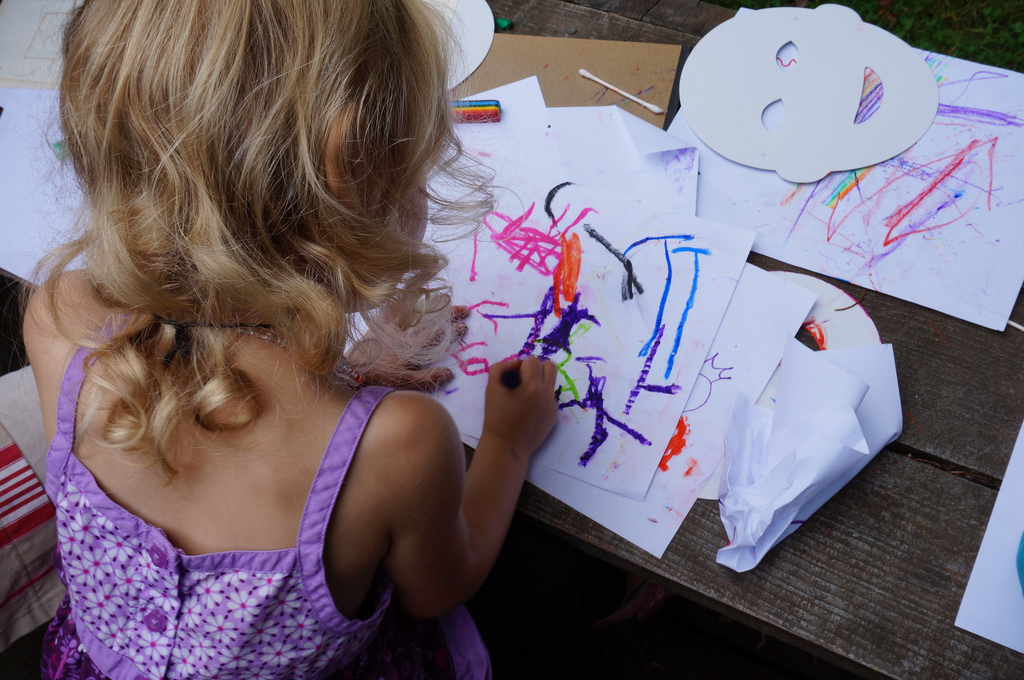Thoughts on Bringing Children To Worship

As parents bringing children and teens to a time of worship can be a struggle. We place a lot of expectations on our kids and often hope they won’t “misbehave” during church. Plus, it is easy to succumb to their rowdiness, distraction and desire for entertainment. The last thing on earth most parents seem to want to hear from their kids is “I am bored.” The response often tends to turn our time of gathered worship into an opportunity to have free babysitting or shuffle them away to some place else, entertain them, or even give them a gadget that will hold their attention.
These responses, while I can completely relate to them, do not honor the fact that our children can actually participate in our worship. They can listen for God. They can pray. They can pick up on the motions and the movements of our faith communities and begin to have them engrained in their hearts. They can even contribute to our meetings. Let’s not be so quick to put them somewhere else or separate them off from the larger group. Instead, let’s find way to engage them. Let’s as families talk about what it is we are doing. And let’s help them to find activities that they can do (quietly) that will help them listen and pay attention, while keeping their minds engaged. Every situation is different and parents know what their particular kid needs, but let’s resist taking the easy way out.
Quakers are no different when it comes to having Children in worship. It is hard to hold a space where children are truly welcomed and where parents feel comfortable bringing their kids, rather than being made to feel like they’re distracting others from their silence. As a Friends minister, I really believe that it is important to have our children with us in worship. While I truly love Godly Play as a children’s education, because I think it helps to mirror not only the biblical story, but the kinds of practices (of listening, of empathy, of participation) that we do in our meetings for worship, as our children get older I think we need to resist the tendency to create more programs for our children so we can keep them busy, entertained or even have age appropriate things for them.
A Quaker meeting for worship is always age appropriate. Vocal ministry may not always make sense, but then again, we as adults don’t always “understand” either. What is central is not necessarily that we always “get it” but that we enter into the practice, which shapes us regardless of how in-depth our theological understanding is. To continue to come back to these practices of listening for God, praying, reading Scripture, and practicing empathy for others is what matters most. Children are capable of these practices. My five and three-year-olds are capable of it, I have seen them make connections on a number of occasions in ways that I missed. And it’s okay if it is boring, either for you or for them. As James Alison says about worship, it is a:
“Long-term education in becoming un-excited since only that will enable us to dwell in a quiet bliss which doesn’t abstract from our present or our surrounding or our neighbor, but which increases our attention, our presence, and our appreciation for what is around us” (46).
So much of our society is about constantly building people up into a frenzy, keeping people distracted by noise, lights, screens, and the sensational. To live a life that follows after God we actually need to unlearn these tendencies. We need to not constantly participate in worship that “abstract from our present or our surrounding or our neighbor,” because so much of what shapes us in life already does this. Instead the simple liturgy of singing, praying, reading and listening for God is to help us slow down and make us un-excited so that we may “[increase] our attention, our presence, and our appreciation for what is around us.”
This is hard for us to invite our children into, because frankly we either don’t know how to do it ourselves or we are afraid to truly let go of the distractions for fear of what we might find. Being quiet with group of people for even a couple of minutes can be a terrifying act. In fact, I’d argue that kids have less inhibition around this than we give them credit for. Can we as parents give our kids the tools they need to help them begin to value our gathering times, and not just value them, but participate in them? We might find that in looking for words to articulate to our children, we first must do deeper in our own understanding and practice. We need to trust that God actually ministers to our children and that we need children in our meetings to help complete “the body.” How might our meeting reflect the conviction that Children have an innate sense of spiritual connection to God? How might our meetings be more inclusive of all ages in our worship? How might we help our children feel connected and important as we worship together?
Let’s not be so quick to follow the pattern that many other churches do and constantly compartmentalize the body into ages, genders, and other unhelpful categories that only further splinter our worship gatherings. Let’s make this about being together and learning the language and practices necessary for being the people of God.
In line with this, I’d like to recommend this article from Friends Journal called “Bringing Children to Worship: Trusting God to Take Over From There, where many suggestions and activities are suggested from other Quaker parents.